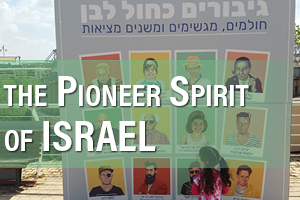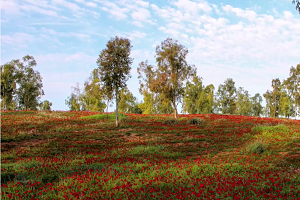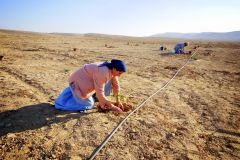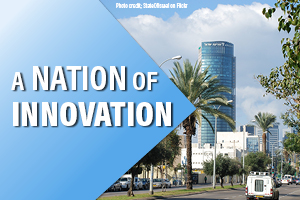Israel's Negev: A Desert in Bloom
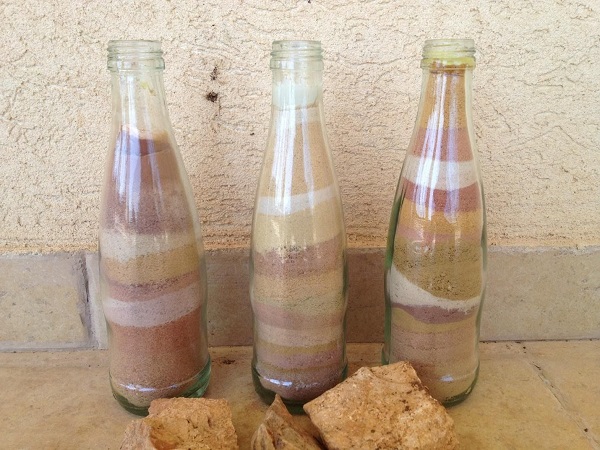
The souvenir glass bottles filled with layers of colored sand that sit on my bookshelf remind me of my first encounter with the Negev as a teenager in the 1960’s. Having grown up in a large urban environment, I was entranced by the barren, yet mysterious beauty of the Negev.
I can understand how the desert served as a place of quiet contemplation where God’s “still small voice” was heard. I also recall a group hike in the early 1970’s through Machtesh Hagadol, sometimes known as Israel’s “Grand Canyon.” We finally found our way out by following the sun as it began to set behind the mountains. More recently, an outing in Park Golda in the Negev taught me about Israel’s amazing drip irrigation that has contributed to worldwide agriculture.
Going back in time to 1947, the United Nations Partition Plan for Palestine recommended that 20% of the land be given to the Jews, and 70-75% of the land to the Arabs. Of that 20%, only 14% of the land was capable of growing produce because an estimated 60 % was northern swamp and southern arid desert. Perhaps because of its geographical distance from the centralized cities of Israel, over time the Negev lagged behind in development and services. Israel’s south was often referred to as “Israel’s forgotten backyard.”
However, David Ben-Gurion, Israel’s first Prime Minister and founding father, believed that the Negev was the future of the country. After leaving government he retired to Kibbutz Sde Boker in the Negev. Ben-Gurion’s words on a monument at Sde Boker read: “Wisdom goes with South…whoever seeks wisdom, south shall he go.”
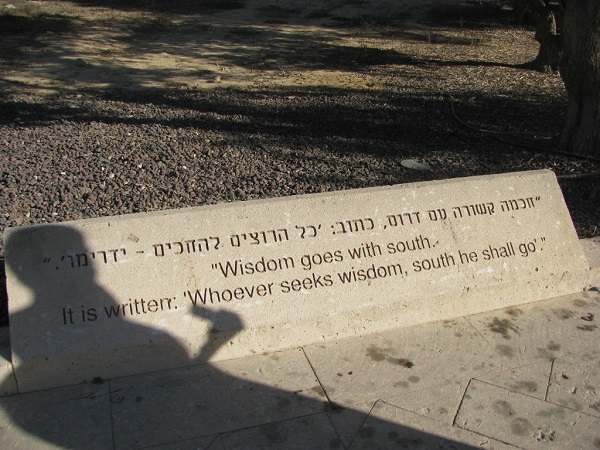
Ben Gurion monument - photo credit Yehudit Garinkol
Ben-Gurion encouraged people to settle in these outlying areas because he felt that it was “in the Negev that the creativity and pioneering vigor of Israel shall be tested and this will be a crucial test.” He challenged scientists to develop the Negev so it would flourish and “reveal secrets of nature unique to our land” that would ultimately “determine the fate of the State of Israel and the standing of our people in the history of mankind.”
Ben-Gurion hoped that the South would ultimately help the North in areas of desalination, solar energy and wind, rainwater harvesting and recycling, and knowledge about vegetation. Unlike many countries where desertification encroached on civilization, impoverished resources, and led to migration and instability, Israel is the only country where desert has receded, from 15 to 60 miles away from cities.
Today the Negev is blossoming, and not just because of the beautiful kalaniyot of early spring; but the Negev is metaphorically in full bloom as well. Israel has become a world leader in water technology and conservation by meeting the challenge of making a desert climate flourish. Israel has exported knowledge about growing crops in increasingly hot and dry conditions and sharing its flagship techniques of drip irrigation and recycling water to help countries around the world.
Who would believe that the city of Beersheva, through Blueprint Negev and under the leadership of the Zuckerberg Institute for Water Research of Ben-Gurion University, is creating the Beersheva River Park? This giant water park is being made out of a dry, garbage-filled river bed, and will become a 1300 acre waterfront with green spaces twice as large as New York City’s Central Park. The lake at the center of this new project will be Israel’s second largest, after the Kinneret.
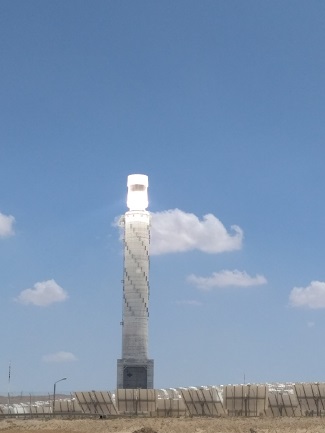
Ashalim Solar Tower - photo credit: נדב פרץ-וייסוידובסקי
And could Ben-Gurion have ever imagined the $650 million dollar training facility that is moving 10,000 soldiers from Tel Aviv to a new central base, along with more mega bases in the Negev? Or Cyber Spark, Beersheva’s sixteen-building technical park doing cyber security research development (including Fortune 500 companies, cyber incubators, academic researchers, educational facilities, national government and security agencies), developments which have attracted foreign investment and participation. There is also the Ashalim Solar Tower, a 4,000-acre solar plant, Israel’s energy project that will help generate 10% of power through renewable energy.
And then, of course, there is Ben-Gurion University of the Negev. The city and the university “grew up” together, from 80,000 residents in 1969 (when the university was established as an institution of higher learning) until today, with over 210,000 residents. As Ben-Gurion University has continued to expand its mission, programs, and facilities, new housing neighborhoods have been built to support the growing population.
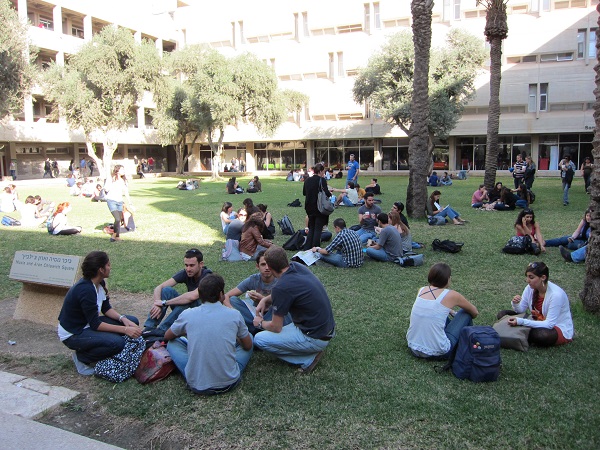
Students at Ben-Gurion University - photo credit: David Saranga, Israel Ministry of Foreign Affairs
Ben-Gurion was more than a visionary leader deeply knowledgeable about the Bible. He also had a genius for building a national culture. He believed that Israel’s purpose in the world was to exemplify Biblical values and apply them to contemporary issues such as health, equality, and the environment through an extensive civil society network. Ben-Gurion believed that Israel should excel at home and be a “light unto the nations” and help others around the world. He wanted the State of Israel to prove itself “not by military might or technological achievement, but by its moral character and human values.”
Ben-Gurion embraced the humanistic values of our Torah, designed to create ethical behavior and a moral society, just as Herzl dreamt of not only creating a homeland and refuge for the Jewish people, but also a better society. These values include protecting the earth, saving lives, seeking justice, including all members in society, showing compassion to the poor, caring for the vulnerable and the stranger, loving your neighbor, and seeking peace. Let us look at some of those values in action in the Negev.
PROTECTING THE ENVIRONMENT
Water is a prized entity and essential priority in the desert. Did you know that joint efforts between Israel, Jordan, and the Palestinians are being conducted to increase the freshwater supply to the region? Collaboration over water brings young teenagers from Jordan, Israel, and the West Bank together under the auspices of EcoPeace Middle East to learn about working together on common challenges to combat such as the shrinking of the Dead Sea. Through cooperative efforts, it is hoped that pumped water will be shared and that someday Israelis, Palestinians, and Jordanians will be drinking the same water to improve quality of life.
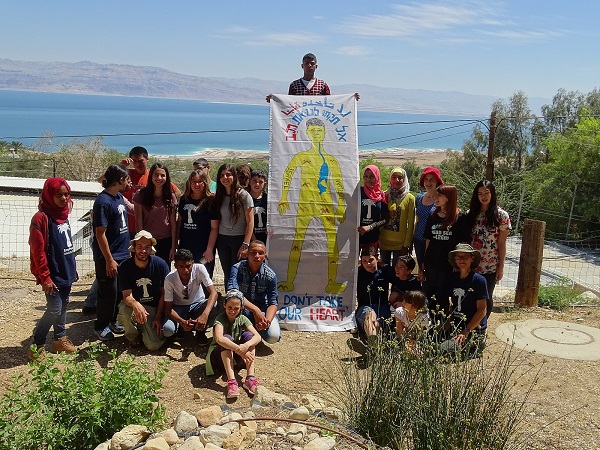
Photo courtesy of EcoPeace Middle East
Kibbutz Keturah, founded in 1973 in the Arava region of the Negev, is built on egalitarian principles and hosts the Arava Institute. There, transboundary research centers conduct seminars for water management, renewable energy, energy conservation, sustainable agriculture and development, and ecology. Multicultural education is offered to students from all over the world who attend a weekly Peacebuilding Leadership Seminar where cooperation and knowledge exchange occurs regardless of the political conflict in the region.
SAVING LIVES
Ben-Gurion University of the Negev and Soroka Hospital in Beersheva are committed to preserving health and saving lives in the Negev. The university has two medical schools, one in Hebrew for Israelis, and a second one, the Medical School for International Health, in conjunction with Columbia University. Students from all over the world attend this school, where global health is a priority. Soroka Hospital serves the multiple ethnic and immigrant groups in the Negev, treats trauma and genetic diseases, and engages in cutting-edge medical and scientific research and inventions in an effort to save lives and improve the health of the region.
SEEKING JUSTICE IN SOCIETY
Observing the lower status of women in the Negev and risks to their physical and mental health because of poverty, missile threats, less access to education, and living in patriarchal cultures, a professor in Ben-Gurion University Department of Social Work founded the Women’s Counseling Center of the Negev (Isha Be-Shela, “a woman in a place of her own”) to improve the health and mental health of women of the Negev. Affordable high-quality psychotherapy services have helped hundreds of women with grief, trauma, chronic illness, aging, loss, anxiety, depression, and training is also offered for mental health professionals. In addition, a volunteer-driven early intervention program called “Mom to Mom” gives new mothers in the Negev a better start with their children.
The Israeli Army is unique in the world in its attempts to be more inclusive by including individuals with disabilities in army service. Two remarkable programs called Special in Uniform and Roim Rachok include young people in the army, provide training, and equip them with skills to function in society after their service.
BEFRIENDING AND LOVING YOUR NEIGHBOR
In the Negev over 30% of the population are Arab Bedouins. Education tends to serve Jewish and Arab communities separately. The Hagar Association, an oasis of shared society in the Negev, was formed to create integrated Arab-Jewish Education. The shared curriculum includes a bilingual framework with mixed faculty (Arab and Jewish), ½ in Hebrew, ½ in Arabic, and follows a problem-based learning model set by the national curriculum. The Hagar school has grown to over 350 children, from preschool through upper school, and is supported by a community of over a thousand parents, grandparents, and neighbors.
Another forward-looking organization is AJEEC-NISPED, or the Arab Jewish Center for Equality, Empowerment, and Cooperation/Negev Institute for Strategies of Peace and Development. This organization brings together leaders from both communities for a year of learning and joint volunteering to give service while getting to know neighbors better. The students come from the Israeli Scouts movement doing a “gap” year before the Army, and Arab Israeli high school graduates. It has become a successful program whose participation has tripled, and hopes to expand to other cities in Israel
A New Dawn is an organization that targets education, employment, and leadership to engage Bedouin and Israeli youth in towns like Rahat and other local moshavim to work together to do good and get to know “the other.”
COMPASSION FOR THE POOR, THE VULNERABLE, AND THE STRANGER
Almost twenty years ago, Beersheva residents witnessed their fellow citizens scrounging for food. To address their suffering, volunteers established a soup kitchen called Be’er Sova. The program supplies daily hot meals in a community restaurant and delivers daily hot meals to those struggling with nutritional insecurity so that no one goes hungry. Today, through partnering with national NGOs, more than 85,000 meals are served per year. More than that, however, Be’er Sova offers dynamic community programming to help break the cycle of poverty by offering legal advice and financial aid, coaching for employment, teaching skills to women to foster job stability, and building bridges between Israeli and Arabs.
Concern for the welfare of African asylum seekers detained at a Negev facility led volunteers, with the support of the social work department of Ben-Gurion University and the Be’er Sova Center for Refugees in the Negev, among other organizations, to provide day school courses for the detainees, who face difficult waiting periods and decisions about their futures. Volunteers teach them about daily life skills, health awareness, and emotional growth.
SEEKING PEACEFUL COEXISTENCE
A poignant note about life in the western Negev is about a moshav called Netiv HaAsara, now located literally on the border with Gaza. After Gush Katif was evacuated, Netiv HaAsara became subject to frequent rocket assaults from Gaza. One could see Gaza militants on the opposite hill, waving flags and shouting, and worse, the militants could see into the moshav’s homes. To deal with this frightening and traumatic reality, a protective wall was built to protect residents from rockets, but the wall obscured the horizon.
A creative mosaic artist on the named Tsameret Zamir decided to paint the wall and create a gigantic mosaic project on the wall called Netiv L’Shalom, the “Path to Peace Wall”. She invites visitors to come and take broken pieces of colorful mosaic tiles and put them on the giant wall, making designs and messages of hope, peace, and messages of hope, peace, and friendship. Beginning with broken pieces to make a more beautiful whole is yet another example of Israeli coping that makes my heart swell with pride.
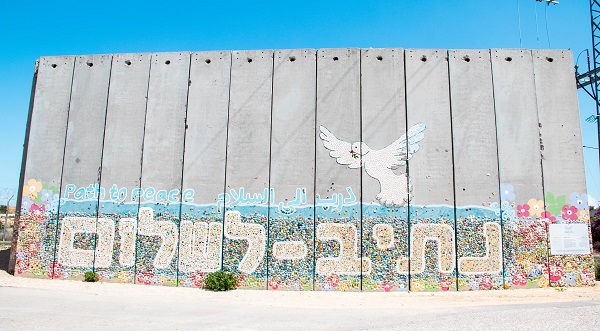
The Path to Peace Wall - photo credit: Oved Cohen
The Negev, a not-so-barren place, is also filled with natural and historical beauty, such as the refreshing springs of Ein Gedi, where King David is said to have gone to bathe. The pillars of Solomon, where Lot’s wife was rumored to have been turned to salt for disobeying God, are here, as well as the ancient well of Beersheva, where Abraham concluded important treaties. Today’s Negev hosts wineries, spa hotels with infinity pools overlooking canyons, nature adventures, and the most delicious chocolate milk at Yotvata, to name a few worthwhile sights.
The words of the prophet Isaiah resonate about the Negev and the land of Israel:
Thirsty deserts will be glad
Barren lands will celebrate
And blossom with flowers
Deserts will bloom everywhere
And sing joyful songs.

